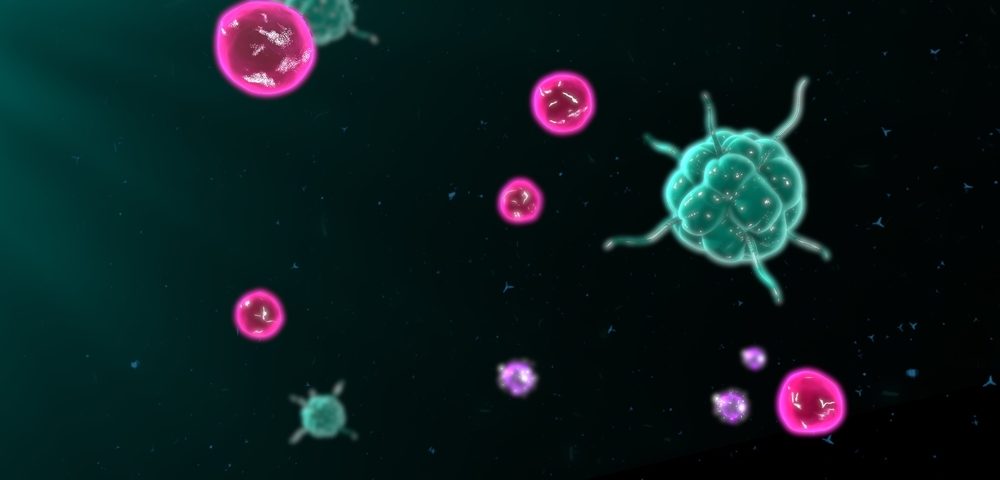A “switchable” CAR T-cell immunotherapy was able to completely eliminate cancer in mice whose tumors came from cells of people with advanced pancreatic cancer, including cancer cells that had moved to distant organs, a new study reports.
These findings suggest that this new CAR T-cell approach is both safe and effective against aggressive pancreatic tumors, the scientists said.
The research, “Switchable CAR-T cells mediate remission in metastatic pancreatic ductal adenocarcinoma,” appeared in the journal Gut.
Pancreatic ductal adenocarcinoma (PDAC), the most common malignancy of the pancreas, is often diagnosed at an advanced stage, with less than 20% of patients having tumors that can be removed with surgery. PDAC patients also typically become resistant to chemotherapy and eventually see their cancer return.
CAR T-cell immunotherapy – an approach that consists in collecting a patient’s own T-cells and modifying them in the lab to recognize cancer cells when injected back into the patient – has been successful in treating some leukemias and lymphomas, its efficacy against solid tumors has been limited.
In the case of PDAC, success is further complicated by the disease’s aggressiveness and late diagnosis. CAR T-cells are also known to markedly proliferate after recognizing their target, meaning they can cause cell toxicity.
Aiming to address these gaps, a research team from the University of New South Wales (UNSW) in Australia, the California Institute of Biomedical Research (CALIBR), and Barts Cancer Institute in London developed an antibody-based, “switchable” CAR system whose activity can be adjusted in the body.
In this new CAR T-cell therapy approach, the ‘switch’ acts as a bridge between the target and cancer-killing cells. Essentially, adapter molecules (also known as antibody switches) allow a CAR T-cell to bind to multiple targets within the same protein or to shut down their activity altogether.
This controls specificity, activation, and ultimately tumor clearance. This system was also shown to be effective in preclinical models of leukemia and breast cancer.
“Switchable CAR-T cells now allow us to stop the treatment, if required, thus making our therapy extremely safe,” Alexandra Aicher of Barts, one of the study’s authors, said in a press release. “Switchable CAR-T cells will also ensure we can rapidly adapt our treatment target to another cancer surface marker, if resistance may occur.”
Investigators first obtained pancreatic cancer cells from patients with late-stage disease (stage IV), and transplanted them into mice. Then, they collected patients’ immune cells to make CAR-T cells specifically targeting a protein called HER2 to eliminate the cancer cells. Of note, HER2 levels are increased in tumor cells, but this protein can also be found in healthy tissue.
After confirming that PDAC tumors produce HER2 at detectable levels and can be targeted by CAR T-cells, the researchers saw a complete elimination of cancer cells, including those that had spread to the liver and lungs, upon five “switch” injections.
“After injecting these CAR-T cells into mice, they were capable of finding any cancer cells in the body, stick to them via surface markers, and subsequently destroy the cancer cells. The treatment was so effective that the animals remained tumour-free,” said Christopher Heeschen, the study’s senior author and a professor at UNSW Medicine. “This is the first time in my career that I have seen an actual cure for this very aggressive disease.”
They also reported that they found that their switchable CAR-T cells to be as effective as conventional CAR-T cells across different doses, suggesting this indicates that the “switch” does not compromise anti-cancer efficacy.
“These results suggest that a switchable CAR-T system is efficacious against aggressive and disseminated tumours derived from patients with advanced PDAC while affording the potential safety of a control switch,” the scientists wrote.
The researchers are now seeking funding to advance development of the new immunotherapy candidate. “We hope to have this new treatment strategy ready for the clinic within the next three years,” Heeschen added.
According to the researcher, the team plans to combine CAR-T cells with treatments that improve the cells’ ability to reach cancer cells. “Pancreatic cancer is known for its fortress-like structure that needs to be overcome in order for the CAR-T cells to reach their target cells and remain at maximum activity,” Heeschen said.


